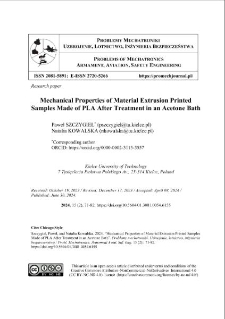Nasza Biblioteka Cyfrowa udostępnia 1 868 obiektów cyfrowych
Obiekt
Tytuł: Mechanical Properties of Material Extrusion Printed Samples Made of PLA After Treatment in an Acetone Bath ; Mechanical Properties of Material Extrusion Printed Samples Made of PLA After Treatment in an Acetone Bath
Tytuł odmienny:
Właściwości mechaniczne próbek wytworzonych technologią wytłaczania warstwowego z materiału PLA po obróbce w kąpieli w acetonie ; Właściwości mechaniczne próbek wytworzonych technologią wytłaczania warstwowego z materiału PLA po obróbce w kąpieli w acetonie
Współtwórca:
Natalia KOWALSKA ; Natalia KOWALSKA
Abstrakt:
This paper presents a study of the effect of chemical treatment using pure acetone on strength specimens made from PLA polylactide produced by 3D FDM/FFF printing technology. The strength specimens were designed in accordance with the ISO 527 standard. The chemical treatment was carried out using baths at different time intervals. The hardness of the samples was measured, and a tensile test was performed. The results show that with prolonged contact with acetone, the hardness of the material decreases by approximately 45% compared to untreated samples. When analysing the tensile tests, it was noted that the tensile strength decreases with longer chemical bath time. At the same time, the material becomes more ductile, resulting in a high elongation at break in tension of up to 40% relative to untreated samples.
;
This paper presents a study of the effect of chemical treatment using pure acetone on strength specimens made from PLA polylactide produced by 3D FDM/FFF printing technology. The strength specimens were designed in accordance with the ISO 527 standard. The chemical treatment was carried out using baths at different time intervals. The hardness of the samples was measured, and a tensile test was performed. The results show that with prolonged contact with acetone, the hardness of the material decreases by approximately 45% compared to untreated samples. When analysing the tensile tests, it was noted that the tensile strength decreases with longer chemical bath time. At the same time, the material becomes more ductile, resulting in a high elongation at break in tension of up to 40% relative to untreated samples.
Miejsce wydania:
Warszawa
;
Warszawa
Wydawca:
Wojskowa Akademia Techniczna ; Wojskowa Akademia Techniczna
Data utworzenia:
Data złożenia:
Data akceptacji:
Data wydania:
Rozmiar:
Identyfikator:
oai:ribes-88.man.poznan.pl:2706
Sygnatura:
doi:10.5604/01.3001.0054.6155 ; doi:10.5604/01.3001.0054.6155
ISSN elektroniczny:
ISSN drukowany:
Język:
Licencja:
kliknij tutaj, żeby przejść ; kliknij tutaj, żeby przejść
Właściciel praw:
Wojskowa Akademia Techniczna ; Wojskowa Akademia Techniczna
Strona początkowa:
Strona końcowa:
Tom:
Czasopismo:
Słowa kluczowe:
3D printing, PLA, acetone, hardness, tensile strength ; 3D printing, PLA, acetone, hardness, tensile strength
Kolekcje, do których przypisany jest obiekt:
Data ostatniej modyfikacji:
16 paź 2025
Data dodania obiektu:
16 paź 2025
Liczba wyświetleń treści obiektu:
0
Wszystkie dostępne wersje tego obiektu:
https://ribes-88.man.poznan.pl/publication/3043
Wyświetl opis w formacie RDF:
Wyświetl opis w formacie OAI-PMH:
| Nazwa wydania | Data |
|---|---|
| Mechanical Properties of Material Extrusion Printed Samples Made of PLA After Treatment in an Acetone Bath | 16 paź 2025 |

